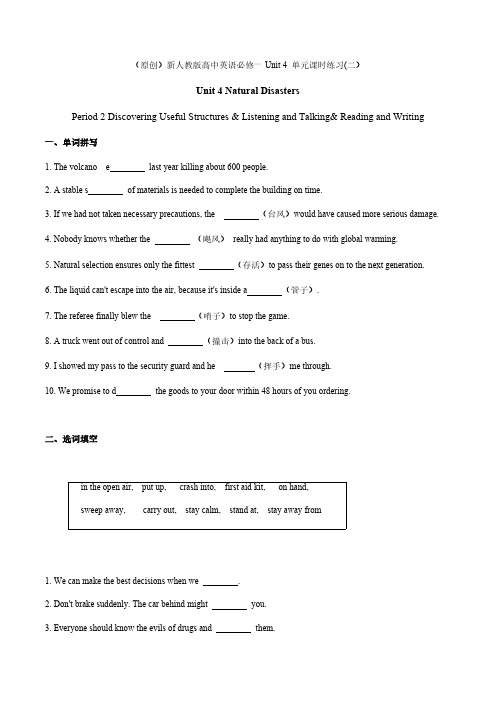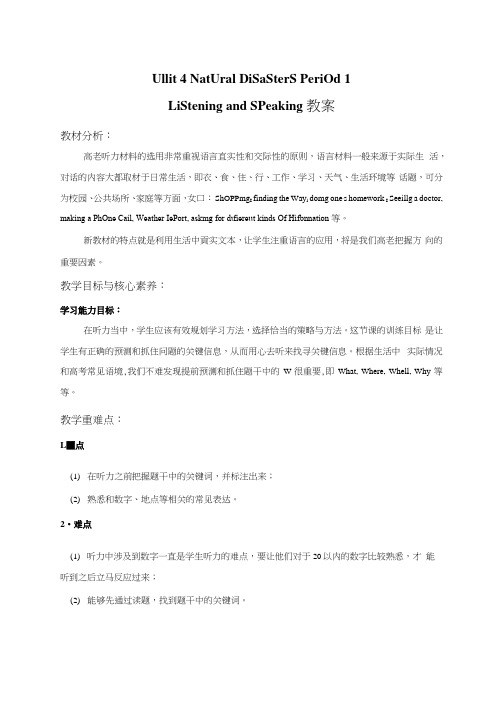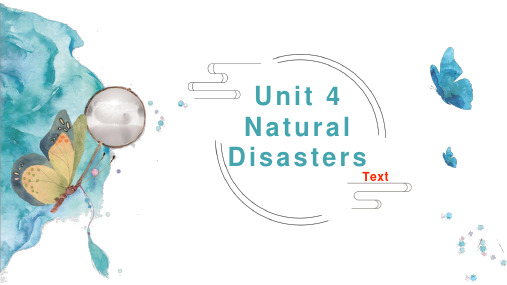2019_2020学年新教材高中英语Unit4NaturaldisastersSectionⅡListeningandSpeaking
2019新人教高中英语必修一Unit4Listening and Speaking公开课课件

flood
tornado landslide
___H__o_m_e_s_a_n_d__la_n_d___ have been R__e_sc_u_e__w_o_r_k_e_rs_and__s_o_l_d_ie_r_s__
destroyed. No one has been killed. are working day and night to
vt. _____保_护__;__掩_蔽_______ vi. ___躲__避__(风__雨__或_危__险__)__
First Listening
What is the main idea of the conversation? Four news reports about natural disasters: earthquake, flood, tornado, and landslide.
At 9:25 p.m. A library and a market. By heavy rain that has fallen in the last week.
Third Listening
Listen again and find out the following information.
7.What caused the landslide in Seoul?
Type of information number
number place activities time place reason
Answer 7.8
About 230 were killed and more than 1,500 were injured. Central China. They are working day and night to make sure that people are safe.
(原创)新人教版高中英语必修一Unit4Natural Disasters 课时练习(二)(附答案)

(原创)新人教版高中英语必修一Unit 4 单元课时练习(二)Unit 4 Natural DisastersPeriod 2 Discovering Useful Structures & Listening and Talking& Reading and Writing一、单词拼写1. The volcano e last year killing about 600 people.2. A stable s of materials is needed to complete the building on time.3. If we had not taken necessary precautions, the (台风)would have caused more serious damage.4. Nobody knows whether the (飓风)really had anything to do with global warming.5. Natural selection ensures only the fittest (存活)to pass their genes on to the next generation.6. The liquid can't escape into the air, because it's inside a (管子).7. The referee finally blew the (哨子)to stop the game.8. A truck went out of control and (撞击)into the back of a bus.9. I showed my pass to the security guard and he (挥手)me through.10. We promise to d the goods to your door within 48 hours of you ordering.二、选词填空in the open air, put up, crash into, first aid kit, on hand,sweep away, carry out, stay calm, stand at, stay away from1. We can make the best decisions when we .2. Don't brake suddenly. The car behind might you.3. Everyone should know the evils of drugs and them.4. We sleep out under the stars, and eat our meals .5. There are experts to give you all the help and advice you need.6. More often than not, it is easier to make a plan than to a plan.7. It is said that the number of the deaths caused by the flood 300.8. In China, people believe fire can bad luck, so, red means good luck.9. Make sure you keep a well-stocked ready to deal with any emergency.10. Many tents were to provide shelters for the homeless in the disaster-hit area.三、单句语法填空1. The project looks at how we could be more (effect)in encouraging students to enter teacher training.2. The more (power)the car the more difficult it is to handle.3. He succeeded the aid of a completely new method he discovered.4. summary, it is my opinion that the whole process of treatment was very successful.5. The president (deliver)a speech on how to effectively solve the immigration problem next week.6. Our English teacher suggests (read)English aloud every morning.7. I was taking am online class in my study I heard a loud noise in the backyard.8. She is the only one of the students won the international award.四、阅读理解Brief Intervention Finds Evidence of Nature’s Impact on HappinessNew research holds the belief that spending time outdoors can contribute to happiness.In fact, if people simply take time to notice the nature around them, it will increase their general happiness and well-being, said Holli-Anne Passmore, a Ph.D. psychology student at the University of British Columbia’s Okanagan campus.Her study, published in the Journal of Positive Psychology, examined the connection between taking a moment to look at something from the natural environment and personal well-being. The study involved a two-week experiment where participants were asked to record how nature they came across in their daily routine made them feel. They took a photo of an item that caught their attention and take down about their feelings in response to it. Other participants tracked their reactions to human-made objects, took a photo and write down theirfeelings, while a nother group did neither.Examples of nature could be anything not human built: A house plant, a dandelion(蒲公英)growing in a crack in a sidewalk, birds, or sun through a window. “This wasn’t about spending hours outdoors or going for long walks in the wilderness,” Passmore says. “This is about the tree at a bus stop in the middle of a city and the positive effect that one tree can have on people.”Passmore reports she was “overwhelmed” not only by the response of her 395 study participants, who submitted more than 2,500 photos and descriptions of emotions, but also by the impact that simply noticing emotional responses to nearby nature had on personal well-being. It also had an impact on their prosocial orientation(亲社会倾向), which is a willingness to share resources and the value they placed on community, she discovered.“The difference in participants’ well-being — their happiness, sense of elevation, and their level of connectedness to other people, not just nature — was significantly higher than participants in the group noticing how human-built objects made them feel and the control group,” she said.1. Which of the following objects may have the strongest positive effect on human well-beings?A. pictures of flowers on the wall.B. Wild animals shown in the video.C. A wild flower in a street corner.D. large bunch of artificial flowers in the office.2. How many group of people were asked to participate in the study?A. twoB. threeC. fourD. five3. According to the passage, who is the most suitable for volunteer work?A. People who often noticing the nature.B. People who always do the housework.C. People who often notice human-made objects.D. People who love doing exercise in the park.4. Where is the passage probably taken from?A. A news report.B. A science fiction.C. A medical report.D. A n entertainment magazine.Unit 4 Natural DisastersPeriod 2 答案一、单词拼写1. erupted2. supply3. typhoon4. hurricane5. survive6. pipe7. whistle8. crashed9. waved 10. deliver二、选词填空1. stay calm2. crash into3. stay away from4. in the open air5. on hand7. carry out 7. stands at 8. sweep away 9. first aid kit 10. put up三、单句语法填空1. effective2. powerful3. with4. In5. will deliver6. reading7. when8. who四、阅读理解【文章大意】本文是一篇说明文。
Unit4ListeningandSpeaking高中英语人教版(2019)必修第二册

is distant, he will find sorrow near at hand.
人无远虑,必有近忧。
diplomatic adj. 外交的
tolerate vt. 容忍
setback n. 阻碍,挫折 indecent adj. 下流的
surrender vi. 投降
vulgar adj. 低俗的
2. Xiao Kong is doing a research project on Confucius philosophy. F
3. As one of Confucius’ descendants, Xiao Kong’s name is recorded in the family tree. NM
disciple n. 门徒,弟子 detain vt. 扣押
jealous adj. 嫉妒的
moral standards 道德标准
border n. 边境
compromise vi./n. 妥协
humiliate vt. 羞辱
moral values 道德价值观
bummer n. 失望,扫兴 six classics (诗、书、礼、易、乐、春秋)
Temple of Confucius Kong Family Mansion Cemetery of Confucius
Fact / Opinion about Confucius
1. Confucius is one of his favourite philosophers. William 2. He was a wise man.
restoration n. 恢复
withdraw vt. 退出
prosperity n. 繁荣昌盛 condemn vt. 判刑
高中英语新人教版必修一Unit4NaturalDisasters教案

Ullit 4 NatUral DiSaSterS PeriOd 1LiStening and SPeaking 教案教材分析:高老听力材料的选用非常重视语言直实性和交际性的原则,语言材料一般来源于实际生活,对话的内容大都取材于日常生活,即衣、食、住、行、工作、学习、天气、生活环境等话题,可分为校园、公共场所、家庭等方面,女口:ShOPPmg I finding the Way l domg one,s homework I Seeillg a doctor, making a PhOne Cail, Weather IePort, askmg for dιfiereιιt kinds Of Hifbnnation 等。
新教材的特点就是利用生活中貢实文本,让学生注重语言的应用,将是我们高老把握方向的重要因素。
教学目标与核心素养:学习能力目标:在听力当中,学生应该有效规划学习方法,选择恰当的策略与方法。
这节课的训练目标是让学生有正确的预测和抓住问题的关键信息,从而用心去听来找寻关键信息。
根据生活中实际情况和高考常见语境,我们不难发现提前预测和抓住题干中的W很重要,即What, Where, Whell, Why 等等。
教学重难点:L■点(1)在听力之前把握题干中的关键词,并标注出来;(2)熟悉和数字、地点等相关的常见表达。
2•难点(1)听力中涉及到数字一直是学生听力的难点,要让他们对于20以内的数字比较熟悉,才能听到之后立马反应过来;(2)能够先通过读题,找到题干中的关键词。
教学过程:Unit 4 NatUrai DiSaSterS PeriOd 2Reading and Thinking 教案教学目标与核心素养:1.TeaCh SnIdelItS to find OUt the ParagraPh topic Sentelices, UnderStaild the basic InfbnllatIoII Of die TangShall earthquake tlιrouglι SkHliining, SearCIlIng aιιd Other Ieadmg SkiIIs.2.Enable SnldelltS to SOrt OUt the details Of the paragraph, to UnderStand the Strange things before die TangShan earthquake, the tremendous destructive force CaUSed by the eartlιquake, and the IaPld and SeIfleSS rescue and reconstruction after the disaster.3.DiSClISS the tliuiking brought by eartlιquake and SUblillIate the theme SignIfiCanee.教学重难点:1.DeVelOP students' IeadIng ability SUCh as Skmiming, SCanning and SllIninarIZing.2.Let StlIdentS talk about the PreCUrSOr before the earthquake, the damage CaUSed by theearthquake, the IeSCUe after die earthquake and die reconstnιctιon after die earthq uake.教学过程:SteP 1 ACtivity 1ACtiVating background informationT: TOday We are gomg to Iearn a PaSSage With the title -The Night the EartIl Didn't Sleep,∖ SO Why didn't the earth SleeP on that night? What happened to the earth? ACnlany there is a movie directed by Feng XlaOgang focuses On the SaIIle earthquake. Now, Γd IIke to ShOW you a SIlOrt CllP Of die movie.1.TaIk about the earthquakeQl: What do you Ieanl from the video?2.Talk about TangShall earthquake.Ql: What do you know about TangShan earthquake?Q2: What do you Want to know about it?SteP 2 AXtiVity 2Reading to get SOme basic information about earthquake1.Read quickly to find the answers to the students' OWn questions.2.Read for the topic SentelICeS and ∖λr ork OUt the OrgallIZatIOn Of die text.Ql: What,s tlιe topic SentenCe m each paragraph?Q2: In What Order does the author describe die earthquake?SteP 3 ACtiVity 3Reading for detailed information1.Read to get detailed information about ParagraPh 1.Ql: What Were tlιe Strange tilings?Q2: What WaS people's IeaCtIOn to tlιese Strange tilings?Q3. Why didn't PeOPle Pay attention to these Strange thmgs/the SignS before the earthquake? T: PeOPle had Iittle knowledge Of earthquake at tlιat tune.Q4: When does this ParagraPh mainly talk about?T: AbnOnilal SigllS before the eartlιquake.2.Read to get detailed InfbrmatiOn about ParagraPh 2.Ql: HOW StrOng WaS die earthquake?Q2: HOW did the PeOPle feel Whell die earthquake happened?Q3: What does this ParagraPh mamly talk about?3.Read to get detailed information about Para. 3.Ql: What Were destroyed?Q2: HOW does die ∖λτιter describe 飞VerythIng iιι the city"?Q3: HOW did the PeOPle feel?Q4: What does this ParagraPh mamly talk about?4.Read to get detailed information about ParagraPh 4.Ql: WhO brought hope back? And Wllat did tlιey do?Q2: HOW did the PeOPle feel after a IOt Of PeOPle Came to rescue?Q3: HOW WaS the City after a IOt Of PeOPle Came to rescue?5.Read to get detailed InfbrmatiOn about ParagraPh 5.Ql: What ShOWS the revival OfTangShaιι?Q2: HOW Call TallgShaIl WViVe itself aιιd get UP On its feet agam?Q3: In tmιes Of disasters, how Can We go tlιrouglι it?T: Iii times Of disasters, We ShOUld unify; ShOW the WiSdom and Stay positive.SteP 4 AXtiVity 4HighIighting the theme and reflecting1.Make a SuinnIary Of die text.2.FUrther IInderStalld the titleQ: After Ollr Ieanimg, Why do you tlιιnk the earth didn't SleeP On tlιat Ilight?T: An earthquake happened. The PeOPle In the earthquake SUfiered a lot. and die PeOPle OUtSide TangShall Λλ-ere ConCemed about the PeOPle there a lot.3.RefleCt tlιroιιglι discussion on Wllat Can be Ieamt after reading.T: DISaSterS are POWerfiIL UnPreParedlleSS Call be deadly. Life is weak, but if PeOPle V t r QTk togetherto help each otlιer5 disasters Can be defeated.TIlere is no IOVe &om disaster, but We have IoVe In the human heart.SteP 5 ASSignmentHOW does the WrIter COlIVey tlιat the earthquake WaS deadly, and tlιat PeOPle Were helpless durmg tlιe earthquake? Try to find SOme attractive and impressive expressions and note them down.UIlit 4 NatUral DiSaSterS PeriOd 3DiSCOVering USefUl StrUCtUreS 教案教材分析:ThiS teaching PerIOd mainly deals With the granmiar: die restrictive relative clauses.ThiS PeriOd carries COnSIderable SignIfiCanCe to the CUlthβatιon Of students' Writing COmPetellCe and IayS a SOlId foundation for the basic appreciation Of Iallgllage beauty. The teacher is expected to enable StUdentS to master tlιis PerIOd thoroughly aιιd COaSOIIdate the knowledge by doing SOme exercise Of good quality.教学目标与核心素养:1.Get SnldentS to ha∖∙e a good IUIderStandlllg Of the basic USageS Of the restrictive IelatiVe clauses.2.Enable SnIdentS to USe the TeSniCtIVe relat∏∙e CIaUSeS flexibly.3.DeVelOP students' SPeaklllg and COOPeratmg abilities.4.Strellgtllell students' great mterest iιι grammar Ieainmg.【学堇难点:HOW to enable SnldentS to have a good ImderStanding Of the restrictive relative clauses, espeCiaIly the IISeS Of the IeIath*e WOrdS SUCh as which, that, who, whom.教学过程:StePl语法知识呈现定语从句(一)——关系代词的用法在复合句中,修饰名词或代词的从句叫定语从句。
Unit4ListeningandspeakingListeningandTalking课件高中英语

Listening and Talking
Unit 4 Natural disasters
1.Listen to the safety instructions for earthquakes; 2.Develop a positive attitude in the face of natural disasters
News report 4:
And in Seoul, a landslide damaged a library and a supermarket in a southern neighborhood. The landslide was caused by the heavy rain that has fallen in Seoul over the past week. According to the police, no one was injured in the landslide, but several cars were damaged. Those are the top news for today, Wednesday 21 July.
News report 2 Good evening. Today is 27 March. More news about the floods in central China. The government is helping more than 12,000 people in Hunan and Jiangxi get away from the rising water. Homes and land have been destroyed, but no one has been killed. Rescue workers and soldiers are working day and night to make sure that people are safe. They are also bringing food and water to those whose homes were lost in the disaster.
Unit 4 Natural课件(17页) 2024-2025学年高一英语人教版(2019)必修第一

Lead-in
Watch a short video about Wenchuan earthquake and share your feelings and thoughts.
1. In this unit, what natural disasters did you learn about? earthquake, flood, wildfire, landslide, tsunami, tornado, hurricane, drought and volcanic eruption.
Activity 5 Reflecting
Think about the following questions.
1.What did you learn about natural disasters in this unit that you did not know before? 2.What else do you want to know about natural disasters? 3.What did you find the most difficult in this unit? 4.What in this unit motivated you most? 5.Overall, I thought this unit was:
2. What other natural disasters do you know? snowstorm, avalanche (雪崩), sandstorm ...
Activity 1: Circle the correct word in each sentence.
1 The tornado that hit Mississippi last week caused a lot of damage/destroy. 2 The mother thanked the rescue/save worker who found her baby. 3 According to experts, the volcano could crash/erupt this week. 4 Thousands of people are suffering/trapping from illnesses after the disaster.
Unit 4 Natural Disasters (课文课件) 【新教材】人教版2019英语高一上册必修第一册同步课件

One third 表示“三分之一”。 英语中分数词由基数词+序数词 构成,分子用基数词,分母用序数词。当分子 大于一时,分母用复数。如:
1/8 one eighth
2/3 two/thirds 3/4 three fourths
P92 Never in all of San Fransisco’s history were her people so kind as on this night of terror.
Never before in history has a city been so completely destroyed.
The wild fire swallowed the entire forest.
Reading for Writing
语法知识难点
Language Point
1, In Sri Lanka, some 1,600 kilometers west of the quake centre, the number of deaths stood at 2498…
Language Point
2, It seemed as if the world were coming to an end!
come to an end 意为“结束”,与the world搭配,表示“世界末日来临”。此外
,come to 还表示“达成;得到”。
come to a decision
在使用隐喻来进行描述的时候通常把被描写的事物比喻成与之相似的事物但不在句子中使用likeas等表示像的词语
Unit 4
2019-2020学年新教材高中英语 Unit 4 Natural disasters Sect

from their own yard. 3.Although I got up with a headache,I went to work _____a_s__u_su_a_l_____(像往常一样). 4.If we _____c_u_t_a_c_ro_s_s____(穿过) the field we’ll get there before Frank. 5.Remember that success is getting up just one more time than you ____f_a_ll_d_o_w__n_____(跌倒
Ⅱ.短语语境填空——根据汉语提示写出适当的短语 1.The city lay _____i_n__ru_i_n_s_____(破败不堪) after the earthquake.Now,rows of houses are
being built. 2.It was reported that an American couple had ______d_u_g_o_u_t_____(掘出) a lot of gold coins
- 1、下载文档前请自行甄别文档内容的完整性,平台不提供额外的编辑、内容补充、找答案等附加服务。
- 2、"仅部分预览"的文档,不可在线预览部分如存在完整性等问题,可反馈申请退款(可完整预览的文档不适用该条件!)。
- 3、如文档侵犯您的权益,请联系客服反馈,我们会尽快为您处理(人工客服工作时间:9:00-18:30)。
Section ⅡListening and Speaking &Reading and
Thinking——Language Points
Ⅰ.重点单词
根据词性和汉语提示,写出下列单词
1.disaster n.灾难;灾害
2.slide vi.&vt.(使)滑行;滑动
3.flood n.洪水;大量vi.淹没;大量涌入vt.使灌满水;淹没
4.rescue n.&vt.营救;救援
5.damage vt.损害;破坏n.损坏;损失
6.destroy vt.摧毁;毁灭
7.affect vt.影响;(疾病)侵袭;深深打动
8.shelter n.避难处;居所;庇护vt.保护;掩蔽vi.躲避(风雨或危险)
9.ruin n.&vt.破坏;毁坏
10.electricity n.电;电能
11.trap vt.使落入险境;使陷入圈套n.险境;陷阱
12.bury vt.埋葬;安葬
13.effort n.努力;艰难的尝试;尽力
14.wisdom n.智慧;才智
Ⅱ.拓展词汇
根据词性和汉语提示,写出下列单词
1.survive vi.生存;存活vt.幸存;艰难度过→survivor n.幸存者;生还者→survival n.幸存
2.death n.死;死亡→dead adj.无生命的
3.shock n.震惊;令人震惊的事;休克vt.(使)震惊→shocking adj.令人震惊的→shocked adj.感到震惊的
4.breathe vi.&vt.呼吸→breath n.呼吸
5.revive vt.&vi.复活;(使)苏醒→revival n.振兴;复苏
6.unify vi.&vt.统一;(使)成一体→unite vi.&vt.团结
7.suffer vt.遭受;蒙受vi.(因疾病、痛苦、悲伤等)受苦→suffering n.折磨;苦难Ⅲ.补全短语
根据提示补全下列短语
1.as if 似乎;好像;仿佛
2.in ruins 严重受损;破败不堪
3.in shock 震惊;吃惊
4.set up 建立
5.as usual 像往常一样
6.come to an_end 结束
7.the number of... ……的数量
8.dig out 挖掘
9.a home to... ……的家园
10.go through 经历
背教材原句记句式结构仿写促落实
1.Chickens and even pigs were too nervous to eat...
鸡和猪都紧张得吃不下东西……too...to...结
构
The little girl is too young
to dress herself.
这个小女孩太小,还不能自己穿
衣服。
2.It seemed as if the world were coming to an end!仿佛世界末日即将来临!as if引导状语
从句
She looks as if she were ten
years younger.她看起来好像
年轻了10岁。
3.Thousands of children were left without parents.
成千上万的家庭被毁灭,许许多多的孩子变成了孤儿。
leave sb.+宾
补...使某人处
于……
What you said left us lost in
thought.
你说的话使我们陷入沉思。
4.About 75 per cent of the city's
factories and buildings,90 per cent of its homes,and all of its hospitals were gone.大约75%的工厂和建筑物、90%的家园和市内所有的医院都消失了。
“分数/百分数
+of+名词”
作主语。
About one third of the books
are worth reading.这些书中大
约有1/3值得一读。
5.With strong support from the
government and the tireless efforts of the city's people,a new Tangshan with 复合结构
He said goodbye to us with
tears in his eyes.
他含着眼泪与我们告别。
was built upon the earthquake
ruins.
在政府的大力支持和人民的不懈努力
下,一座崭新的唐山在地震废墟上建成
了。
rescue n.&vt.援救;营救
(教材P48)What are the rescue workers and soldiers doing in the floodhit area?
救援人员和士兵在洪水灾区做什么?
(1)rescue sb./sth.from... 把……从……营救出来
(2)come to one's rescue 来营救某人
a rescue team 救援队
①The police came to his rescue and sent him home.
警察救了他,并把他送回了家。
②Tom rescued a boy from the river on his way home.
汤姆在回家的路上从河里救了一个男孩。
③A large number of soldiers were sent there to rescue(rescue) those trapped in the building.
大批士兵被派往那里营救被困在大楼里的人。
[语境助记]
As soon as the accident happened,the rescue team came to the victims' rescue,and they didn't give up any hope of rescuing them from danger.
事故一发生,救援队就来营救受害者了,并且他们没有放弃使他们脱离危险的任何希望。
damage vt.损害;破坏
n.损坏;损失
(教材P48)Which buildings were damaged in Seoul?
首尔哪些建筑被毁?
(1)do/cause damage to 给……带来/造成毁坏
(2)be badly damaged 遭受严重损害
damage one's health 损害某人的健康
一次吃太多的肉会对你的胃造成损害。
